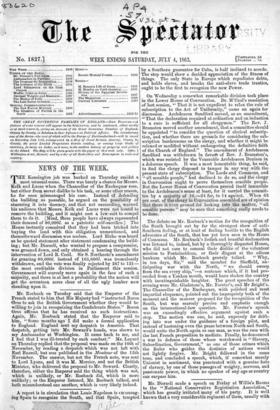The debate on Mr. Roebuck's motion for the recognition of
the South brought out by far the strongest show of anti- Southern feeling, or at least of feeling hostile to the English advocates of the South, that has yet been seen in the House of Commons. Mr. Roebuck's foolish and boastful declamation was listened to, indeed, but by a thoroughly disgusted House, who did not care to conceal their dislike of the volunteer mission to Fontainebleau or their disgust at the odious bunkum which Mr. Roebuck gravely talked. "Why, in ten days, Sir," said the member for Sheffield, an- ticipating war with the North, "we should sweep from the sea every ship,"—a sentence which, if it had pro- ceeded from a Yankee mouth, would have shaken the country with inextinguishable laughter. The great speeches of the evening were Mr. Gladstone s, Mr. Forster's, and Mr Bright's. The Chancellor of the Exchequer, with polished and most impartial eloquence, pointed out the impropriety both of the moment and the manner proposed for the recognition of the South, but was scarcely precise and emphatic enough on the international-law question. Mr. Forster's speech was an exceedingly effective argument against such a step. The motion was one, he said, expressly for drift- ing into war under the guidance of a foreign pilot, and. instead of hastening even the peace between North and South, would unite the North again as one man, as was the case with the last French proposition to mediate. Finally, he denounced a war in defence of those whose watchword is "Slavery, Subordination, Government," as one of those crimes which the Ruler who guides the destinies of nations would not lightly forgive. Mr. Bright followed in the same tone, and concluded a speech, which, if somewhat merely Unionist in sentiment, was penetrated with a genuine hate of slavery, by one of those passages of weighty, nervous, and passionate power, in which no speaker of any age or country can surpass him.






























